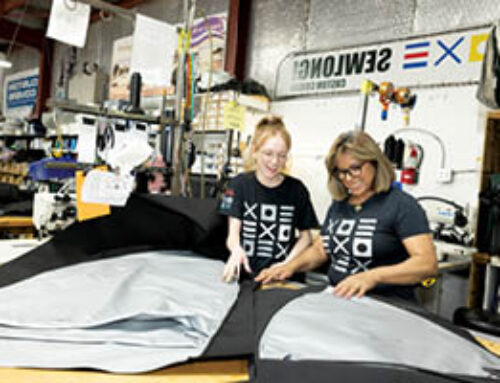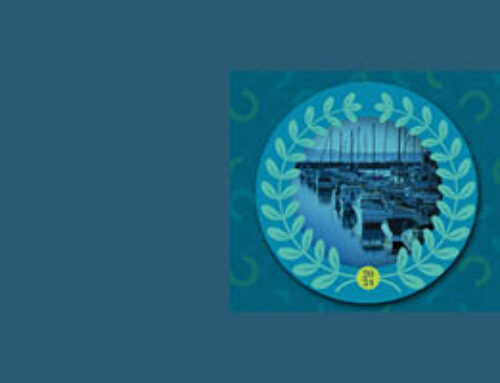Asking competitors for help
Concerned you’ll lose customers if you ask competitors for help? Not to worry.
For many people, asking for help is an acquired skill. Faith Roberts, owner of Banner Canvas, Ham Lake, Minn., knows this first hand. Her customer wanted a wakeboard tower covered. No problem, said Roberts. Then reality set in.
“I kept telling myself that I’m a master fabric craftsman,” Roberts says, “so I should be able to do it. I quoted the customer $300 and thought, this should be pretty easy. But I had never done one before. Well, I got into it and got into real trouble with convex and concave curves and all kinds of zippers. When my client picked it up, I said I could only charge the $300, but should I do this again, it’ll be $1,200. I took a financial bath on this.”
The kicker came as Roberts lamented her losses on this job to a colleague at a Los Angeles expo last year. She was reminded of Justin Jones, team leader at Sewlong Custom Covers in Salt Lake City, Utah, who specializes in covering wakeboard towers. “Justin just happened to be behind me looking at the pictures I was showing on my phone. He said, ‘You should have called. I could have helped.’ He told us it was a teachable moment for his staff. He said, ‘If someone with 30 years of experience [Roberts] gets into trouble and doesn’t pick up the phone, it’s her own fault.’ If you get into trouble, you need to stop and ask so you don’t needlessly continue to struggle.”
Refer the job on or request help?
Marine fabricators don’t often ask competitors for help; they are independent DIYers by nature with the savvy and can-do spirit to solve most problems. Yet there are times when fabricators become swamped or, like Roberts, involved in projects beyond their current skills or staffing and equipment capabilities. They have two choices: refer the project to someone else or request help.
“Mostly, I just pass the job on to somebody more qualified,” says Bev Kennedy, owner of Bev’s Canvas Covers in Waterford, Mich. “That’s the ethical way to do it. And down the road, I’ll get business from that referral, because the shop will need a repair. So I’ll still benefit from a referral. Right now we have several boat hoist canopies that are a very big job. I don’t have the staff to do these. So Bill’s Custom Canvas in Clarkston, Mich., is going to do those for me and help me get caught up a little bit.”
Does Kennedy worry about losing that customer to Bill’s Custom Canvas? “No, that’s not an issue,” she says. “We’ve been friends a long time, and if they need products and I have them, I help them out. In this area, I think every canvas shop works that way.”
‘I’ve got your back’
Another benefit to referring is customers’ respect that comes with turn-around time when shops don’t make them wait any longer than necessary. “I’ve been in business 27 years, so I know everybody and keep a good relationship with competitors,” says Liz Diaz, owner of North Beach Marine Canvas in San Francisco, Calif. “If I get backlogged or derailed, I have no problem recommending another shop. Customers can decide if they don’t like me. Your own best work speaks for itself—and I have too much on my plate, anyway.”
Referring also reinforces the ideal of what goes around comes around, relaxes would-be competitors with evidence that there’s a wealth of work to divvy up, stimulates fabricators to “up their game” with more training or equipment, and strengthens the “I’ve got your back” camaraderie that’s developed in the industry.
“We are in an area where there really isn’t a lot of competition, and there are lots of boats,” says Tom Matson, MFC, in the canvas department of the Afton (Minn.) Marina and Yacht Club Inc., who freely advises colleagues at other shops. “It’s not like if we tell our trade secrets, we’ll lose business. If other shops ask about a product—about horizontal framing, for example, which makes for a more open view when you remove the curtains. It can be tricky with double crowns on the back frame. We do this, but it’s not your standard style of frame. Other nearby shops will see that framing anyway and will ask how we do this. We have no problem sharing that. Around here, there’s not so much the referral directly, but because we are in a friendly relationship, somebody is not going to be badmouthing us. In the big picture, giving advice enables other shops to increase their quality of products. That means everybody up and down the river benefits from that.”
Protection of a network
Referring and willingness to share advice and equipment are common in the marine fabricator business, even though open-door shop owners have been taken advantage of. “A lady who went into business here didn’t know how to price boat covers,” recalls Kennedy. “She told her customers to get a price quote from other canvas shops—and then show her the quote, which she would beat.”
Kennedy shares another awkward situation. A pontoon hauler secretly gave an upholstery repair job to his girlfriend so she could start her business; however, the customer thought the pontoon hauler had given the job to Kennedy. The girlfriend completed the job but had not returned the project to the customer. Meanwhile, the customer called Kennedy, wondering when the project would be done.
In the short run, these new business owners benefited. However, the protection of a local network based on trust and sharing prevailed. “Word got out what was happening,” says Kennedy, “so with companies that deal like that, I don’t recommend them to anybody. You help people who help you, and vice versa.”
Not only does networking protect fabricators from shops lacking integrity, it also protects fabricators from headache customers. Roberts once spread the word about a customer who got rough with her. “Yeah, it was ugly,” she says. “The guy put his hands on me. I was coming down a ladder and he grabbed my arm and said, ‘You’re going to tell me when you’re going to get this done!’ I’d known him for more than 20 years. Something clearly was wrong, and I don’t know what the other issues were. I had the job three-fourths done, and he took it away. It wasn’t a pleasant experience, and I wanted to make sure my competitors didn’t fall into that same trap.”
Enlarging your network
The work of marine fabricators is often isolating, packed with sustained pushes, long hours and sometimes dirty, difficult details that scare off all but the most committed. So it’s a blessing when shops share, look out for each other and stay in touch.
“Conferences and networking have led to this environment,” Roberts says. “That’s been my experience in this business all over the country. There’s a wonderful network of people who all have competitors in their area. I know I can pick up the phone and ask a question of dozens of people at any time. The Marine Fabricators Association (MFA) has really helped. There are probably 4,300 fabrication shops across the United States, and there are not enough of us. I’m so busy with work, as are others who are trying to do the work well. But back in 1987 when I bought my company, there wasn’t an open-door policy. You wouldn’t dare walk into another canvas shop, much less ask for help.”
Tom Matson and his business partner Greg Smith are typically asked for help, which they give without hesitation. Yet they still benefit from being professionally connected nationally. “The biggest outside help I’ve had on work issues comes from the MFA, through its convention and networking,” Matson says.
Roberts says she has hosted a few regionals in her shop and has never lost customers because of it. “All your competitors in the area come,” she says, “so you agree to open your shop and share information. Then you go into a networking situation that’s more casual with drinks, hors d’oeuvres and a relaxed atmosphere. You come to find out that people aren’t afraid to open their shops and have competitors dig around and figure out what their shop is doing.
“You can’t get into that thinking that ‘I don’t want to talk to anybody. They may learn something about my business.’ Networking is the key. It helps people who are hungry for knowledge and who want to be accepted and have a viable business.”
Gary Legwold is a freelance writer from Minneapolis, Minn.
 TEXTILES.ORG
TEXTILES.ORG 






